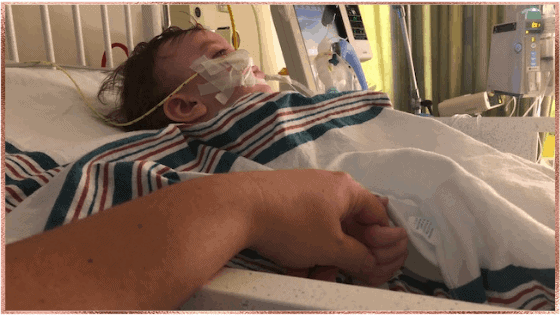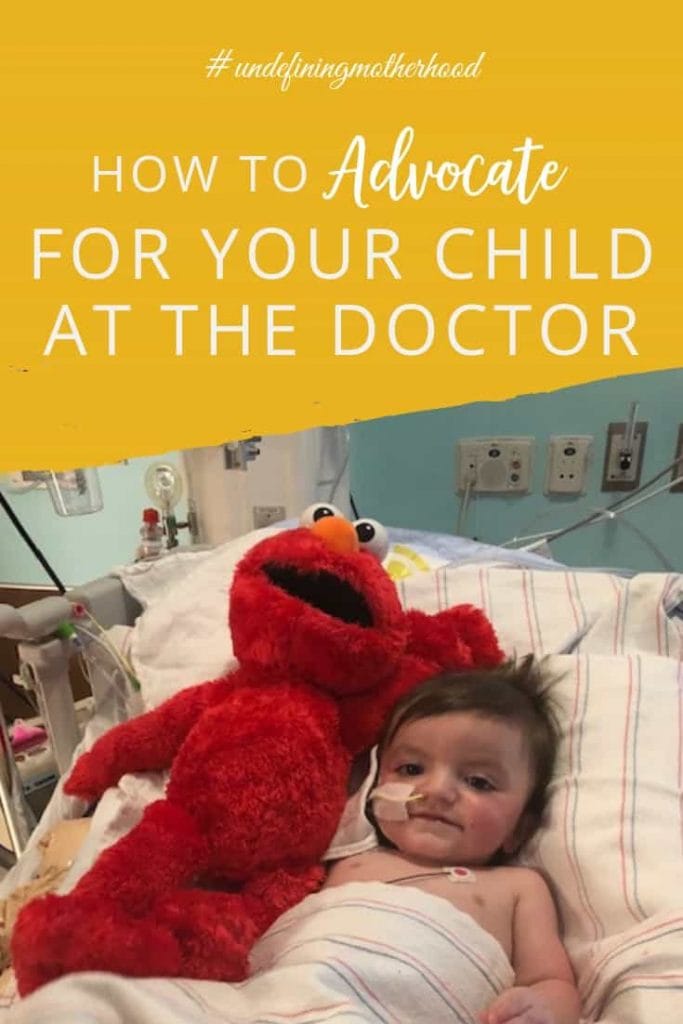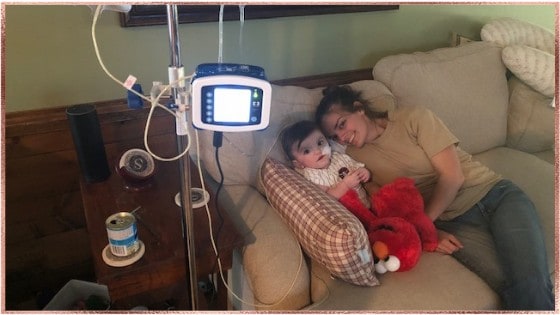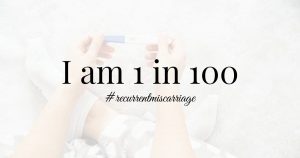What do you do when you suspect your child carries a chromosomal translocation? When your child has special needs, developmental delays, and major health problems, many mothers are forced to ask, “How do I advocate for my child at the doctor?” When you’re stuck in the Pediatric Intensive Care Unit (PICU) and you’re confident the diagnoses are incorrect, how do you push for further testing? Faith navigated all of these tricky situations to finally diagnose her son’s unbalanced chromosomal translocation. More on what this means later.
This is Faith’s story. It’s a story of navigating hospital pediatric intensive care units, misdiagnoses, and advocating for her child at doctor’s offices and in hospitals…over and over and over again.
This is a story of recognizing that a child’s special needs go far beyond what doctors suspect. And one of knowing that, had he been diagnosed properly from the beginning, those special needs may be far less prominent today.
It’s the story of a mother who wouldn’t stop fighting for her son. Who followed her gut until she found answers.
The answers were in their family’s genetic history.

This site contains affiliate links, meaning that we earn a small commission for purchases made through our site. We only recommend products we personally use, love, or have thoroughly vetted.
- Choosing Genetic Testing When You Know You Carry a Chromosomal Translocation
- Advocating for Your Child at the Doctor to Find a Cause for Developmental Delays
- Jacob’s Time in the Pediatric Intensive Care Unit (PICU)
- Finally, A Diagnosis: Jacob Carries an Unbalanced Translocation
- Mother and Son—Finally at Home
Choosing Genetic Testing When You Know You Carry a Chromosomal Translocation
Faith is the mother of a wonderful two-year-old son, Jacob. Before Jacob was conceived, Faith knew she was a carrier for a chromosomal translocation—a balanced translocation between her fourth and sixth chromosomes.
Faith knew she was a carrier because her mother found out during her first pregnancy that she had a balanced translocation between chromosomes 4 and 6. Faith’s mother was open about the possibility that Faith might have this same translocation.
That is, Faith knew her whole life that her pregnancies would need to be tested. She was at a greater risk for carrying a child whose chromosomal makeup could produce special needs, or was not compatible with life at all.
What is a Balanced Translocation?
A person with a balanced translocation has all the necessary genetic material to develop normally, usually with a piece of one chromosome broken off and attached to another. There are rarely symptoms. That’s why Faith functions as someone with a completely normal chromosomal structure, just like her mother before her. You can read more detailed information here.
Carriers of chromosomal translocations, however, have a greatly increased likelihood of conceiving a child with unique and severe chromosomal abnormalities. This often results in miscarriage, a subject you can read about extensively on this site. (Learn what to expect when you miscarry here. Read about coping with pregnancy after loss here.)
A fetus with severe chromosomal abnormalities is often incompatible with life outside the womb. Or, as in Jacob’s case, an unbalanced translocation can cause pronounced special needs. These needs can be recognized in the early years by health problems and developmental delays.
If you suffer from recurrent pregnancy loss, like Katy discusses in “My Arduous Journey to Becoming a Mother,” ask your doctor to perform karyotype testing. This simple blood test, run on both partners, will tell you if one of you carries a balanced translocation. Often, but not always, a body will miscarry when it recognizes the chromosomal translocation of the baby. Click here to read more more about the connection between chromosomal translocations and pregnancy loss.
Genetic Testing During Pregnancy
When trying to conceive, carriers of chromosomal translocations have 3 options.
- Undergo In-Vitro Fertilization (IVF) with Preimplantation Genetic Screening (PGS) to determine which embryos have normal chromosomal structures. (This process is effective, but also invasive, time-consuming, and VERY expensive.)
- Undergo testing during pregnancy to determine the likelihood of a genetic abnormality. (This option is slightly less accurate, but also much more affordable.)
- Wait and see. (Obviously the least expensive option, many parents simply can’t make this choice. It means they’ll spend an entire pregnancy wondering if their child will even be able to live outside the womb.)
With this knowledge, Faith had genetic testing (a Chorionic Villus Sampling) during her first trimester of pregnancy with Jacob.
The test results, she was told, did not point toward any chromosomal abnormalities, specifically the one that Faith has.
The first genetic counselor she met with told her that she had a 25% chance of having a baby with an unbalanced translocation, and a 75% chance of having a “healthy” baby. (The chance of her child carrying a balanced translocation, like Faith, was 21-27%. The chance of her child being genetically unaffected by her chromosomal translocation was 48-54%).
Advocating for Your Child at the Doctor to Find a Cause for Developmental Delays
Flash forward to sweet Jacob at 14-months-old. Just past his first birthday, Faith knew something was wrong. Despite the original lab results, she suspected an unbalanced translocation. Health issues and developmental delays, both of which Jacob had experienced, are often the earliest signs of an unbalanced translocation.
Jacob was developmentally delayed. He was not yet eating properly or crawling. Faith had been concerned for months, but doctors blamed Jacob’s developmental delays on his premature birth. (He was born 9 weeks early).
Day to day, Jacob had the physical capabilities of a 5-6-month-old. He could sit by himself and had lots of tummy time. He could roll. But he couldn’t crawl, feed himself, or hold his bottle efficiently.
At 1 Year Old with 6-Month-Old Abilities, Faith Struggled to Believe Jacob’s Special Needs were Due to Being 9 Weeks Premature
At his 12-month check-up, Faith really started to voice her concerns about Jacob’s development.
She found herself all but demanding a referral to physical and occupational therapists.
When no one sees the necessity of sending your child for further testing, they won’t get it unless you advocate for your child at the doctor. That’s exactly what Faith did.
After the therapists’ evaluations, specialists suggested that Jacob have a full neurological and orthopedic workup.
At this point, Faith was mostly irritated. After so many checkups, the hospital system and doctors who had seen him had not stayed on top of his care. She saw his special needs when no one else did.
Navigating the Pediatric Intensive Care Unit
One Saturday evening in early June, Jacob’s health issues flared up majorly. He became very lethargic and developed a tick. Faith realized he was having a seizure and rushed him to the hospital. Doctors told her it was a febrile (fever induced) seizure.
Her gut knew the doctors were wrong.
Once Jacob was stabilized, he was tested for infection, which revealed rhino entero with bacteria, a relatively simple respiratory illness. His little body also underwent a number of other procedures:
- MRI of the brain
- Head CT
- Chest CT
- Dozens of x-rays
Then, Jacob endured a second seizure and a blood transfusion, which led to a diagnosis of strep pneumonia.
Faith Knew in Her Gut: She had to Demand Action
During this time, the MRI of Jacob’s brain came back as abnormal. Faith felt certain that Jacob’s fight for his life wasn’t just from a serious illness. She demanded further genetic testing. Again, one of the earliest signs of an unbalanced translocation is health problems.
Faith had begun to believe that the original test results were wrong. While the test looked for genetic abnormalities in general, it was focused on Faith’s specific balanced translocation. If Jacob had an unbalanced translocation, as Faith knew his symptoms suggested, the results could have missed it.

Faith muscled her way through the intricacies of the medical system mostly alone. She constantly advocated for her child, while also worrying, hoping, and working. Her husband, a reservist for the army, was out of town, about two hours away, when Jacob began seizing.
Once the doctors told Faith that Jacob would be admitted and spend weeks in the hospital, her husband came home. He was very supportive, mostly listening and supporting any medical decision she felt was right.
After 10 days of watching Jacob’s condition worsen, Faith insisted he be moved to a larger, research hospital before he became too sick for transport. Watching his second seizure and seeing his medical team struggle to keep him from slipping further were the last straws.
Jacob’s Time in the Pediatric Intensive Care Unit (PICU)
During Jacob’s time in the hospital, Faith put her fears aside to be completely present. This is a monumental feat when we mostly want to curl into the fetal position and cry.
But Faith had to be her child’s advocate, and she was.
While Jacob was in the Pediatric Intensive Care Unit, Faith went to work every day from 7:30AM-4:30PM without a lunch break. She went back to the hospital to spend the night.
She was able to take phone calls. She even gave medical consent for medical procedures while working.
At the first hospital, she and her husband stayed in the Ronald McDonald room. At the second, they slept in Jacob’s room.
By the time Faith had Jacob transferred to a larger, research hospital, Faith knew she needed answers and needed them fast. “I saw a ton of experts and specialists,” Faith recalls, “and I demanded that we needed to start checking off all the boxes.”
“I would call my reaction [to Jacob’s hospitalization and focus on his care] more of an instinct than a sacrifice. I simply knew my child better than anyone else and I wasn’t going to stop until someone agreed with me.”

Finally, A Diagnosis: Jacob Carries an Unbalanced Translocation
Faith asked for another round of genetic tests because her intuition suggested that perhaps Jacob’s en-utero testing had been wrong. Faith was right. Doctors had initially read Jacob’s lab reports wrong.
What happened next shocked even Faith.
They found out that Jacob’s diagnosis was EXACTLY what the original doctors had said he DID NOT have! Jacob has a small piece of his 6th chromosome that is missing (deletion), and a larger piece of his 4th chromosome that is duplicated two additional times.
It’s the extra and missing pieces of chromosomes that give Jacob an unbalanced translocations, unlike Faith’s balanced translocation, which is symptomless. Read more about the difference here.
The Physical Effects of an Unbalanced Translocation For Jacob
Jacob’s symptoms consisted of various special needs. These special needs manifested in 3 ways.
- Major health issues
- Significant developmental delays
- Substantial fine and gross motor skill delays
After finally getting the diagnosis that Faith was initially told Jacob did not have, the unbalanced translocation explained all of his previous issues:
- Inguinal hernia
- Umbilical hernia
- Overall hypotonia (commonly known as Floppy Baby Syndrome)
- Undescended testicle
- Pre-term birth
- Feeding issues
- Need for ear tube placement
- Constant illness
- Development delay
- Fine and gross motor skill delay
- And all other special needs
Developmental Delays and Other Special Needs: Would an Earlier Diagnosis with Intervention Have Prevented Them?
Due to the lack of research, Faith and her family still do not know the full extent of the symptoms. It’s still a question how well Jacob will be able to catch up, or if he will catch up at all.
If Jacob had been diagnosed sooner after birth, he would have been in physical therapy, occupational therapy, and feeding therapy MUCH sooner. Presumably, or at least very possibly, he would be less behind the curve.
Jacob spent 3 weeks in the Pediatric Intensive Care Unit and one on the pediatric floor.
He is now just shy of where he should be occupationally, 12 months behind on physical therapy, and 6 months behind on speech.
I say “behind” because all of this therapy could have been in progress from the moment Jacob was born if they had only known he needed it. His developmental delays could’ve been addressed, and possibly prevented, if doctors had properly diagnosed him earlier.
Eating is still Jacob’s biggest struggle, and Faith hopes that he will have his feeding tube out by kindergarten.
Jacob’s progress is due to Faith’s demand that he be genetically tested again. The ensuing diagnosis finally gave him a ticket into testing and treating other potential issues.
Faith became a master at answering the question, “How do I advocate for my child at the doctor?” And it’s because of her persistent advocacy that Jacob has improved so vastly and has the ability to thrive with and through his special needs.
Mother and Son—Finally at Home
Jacob’s family is proud of his sweet attitude and resilience through all of his trials. In the three months between his hospitalization in June and his diagnosis in September, his little body endured so much. Not to mention all his mama’s heart endured, as well.
But she proved that her own endurance and intuition are sometimes the best medicine her child could receive. She proved the importance of trusting your instinct.
She lived the answer to the question, “How do I advocate for my child at the doctor?” The answer: you just do. You do what’s hard because your child deserves it.

“How do you advocate for your child at the doctor? Here is one mother’s story of fighting for a correct diagnosis and learning that her son’s special needs were due to an unbalanced chromosomal translocation.”
Stay tuned for the next part of Faith’s story in about a week, as we follow her through a second pregnancy, one that she found out about shortly after Jacob’s hospitalization and belated diagnosis.
Share with us your stories of motherly resilience and intuition. Were you ever right about something related to your child’s health when a whole team of doctors had it wrong? How do you know when to trust your gut vs. when to trust the medical team you’ve chosen?
This post was co-authored by Faith, Jacob’s resilient mama, and Undefining Motherhood editor Sarah Creel.










4 thoughts on “On Chromosomal Translocations: Advocating for your Special Needs Child”